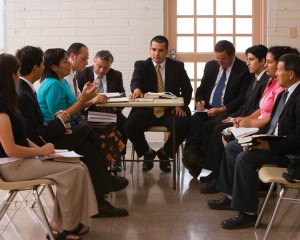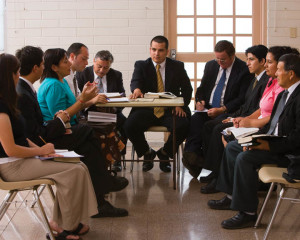Young Jacob, of the Book of Mormon, had been given a most challenging life. He was born as his family traveled through the wilderness, working their way toward the homeland God had chosen for them. Homelessness was his entire experience growing up, so it wasn’t the challenge for him it was for his older brothers, but it was a challenge.
 One challenge Jacob faced was the strife in his own home. He was the fifth of six children. The two oldest, Laman and Lemuel, resented beyond measure having been forced to abandon a comfortable life of privilege for a long journey in the wilderness, with all wealth left behind. They started with mere whining, annoying enough, but harmless. However, as time went on, they moved to violence against those they blamed for the change in status. Even angels could not permanently convince them this was really God’s doing.
One challenge Jacob faced was the strife in his own home. He was the fifth of six children. The two oldest, Laman and Lemuel, resented beyond measure having been forced to abandon a comfortable life of privilege for a long journey in the wilderness, with all wealth left behind. They started with mere whining, annoying enough, but harmless. However, as time went on, they moved to violence against those they blamed for the change in status. Even angels could not permanently convince them this was really God’s doing.
Jacob had grown up in this atmosphere of violence and danger, with two selfish young men trying to destroy a family that was focused on obeying God. His parents, while seldom wavering and never giving up on their wayward sons, were overwhelmed with grief, as are all parents who see their children taking completely destructive paths.
Lehi, the father of the family, spoke to Jacob through revelation, shortly before the patriarch’s death. He promised Jacob his trials would be consecrated for his good.
What is consecration? Neal A. Maxwell, of the Quorum of the Twelve Apostles, said,
“We tend to think of consecration only as yielding up, when divinely directed, our material possessions. But ultimate consecration is the yielding up of oneself to God. Heart, soul, and mind were the encompassing words of Christ in describing the first commandment, which is constantly, not periodically, operative (see Matt. 22:37). If kept, then our performances will, in turn, be fully consecrated for the lasting welfare of our souls (see 2 Ne. 32:9).
Such totality involves the submissive converging of feelings, thoughts, words, and deeds, the very opposite of estrangement: “For how knoweth a man the master whom he has not served, and who is a stranger unto him, and is far from the thoughts and intents of his heart?” (Mosiah 5:13). –Neal A. Maxwell, “Consecrate Thy Performance,” Liahona, Jul 2002, 39–42”
For Jacob, then, this meant his trials would be used to help his spiritual life. They were consecrated to help him better serve God. This, of course, was not automatic. Jacob had to work to make this happen. He had to approach trials with an attitude of choosing how they could help him. He had to choose to turn to God for help through them.
Consecration is a choice. It’s certainly not an easy one. The Bible tells of a young man who was generally keeping the commandments and wanted to know, from Jesus, what else he could do. Jesus suggested he give up all he owned. The young man, willing to pay tithing, treat others well, and keep various other commandments, was not willing to go that far.
Consecration is a total commitment to Heavenly Father and the Savior. It’s the level of commitment Jesus showed in the Garden of Gethsemane. Nothing was held back from his service to God, then or at any other time in his ministry. This is the goal we are asked to work toward—completely consecrating ourselves to the service of God, holding nothing back for ourselves. We may not entirely reach it in this lifetime, but we can move closer to it each day. If we do, then we, like young Jacob, will find that all that happens will work to bring us closer to God.
The late Terrie Lynn Bittner—beloved wife, mother, grandmother, and friend—was the author of two homeschooling books and numerous articles, including several that appeared in Latter-day Saint magazines. She became a member of the Church at the age of 17 and began sharing her faith online in 1992.


